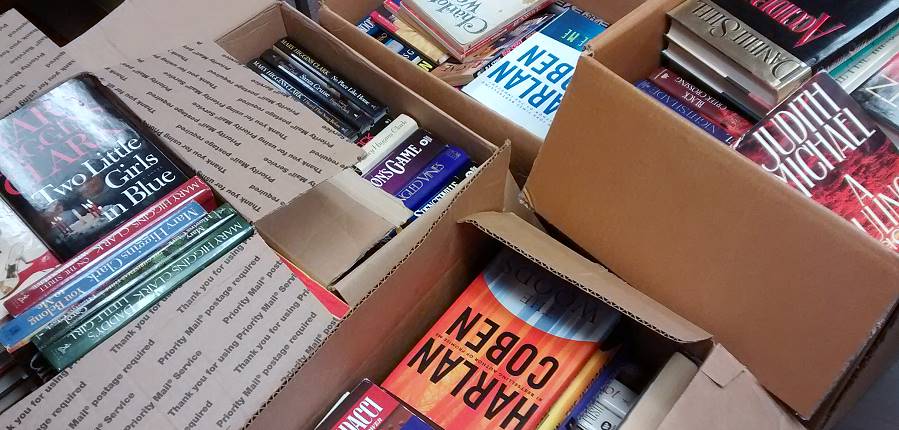Picture this: You find yourself surrounded by an impressive collection of books, unsure of your next steps as you simply have no clue what to do with old books.
You can be a voracious bibliophile, a habitual book collector, or you can be just looking to declutter your room and make room for new reads, it’s apparent that donating your used books can be immensely rewarding.
In addition, donating books reduces waste and promotes sustainability by giving them a second life. As a result, instead of letting your books collect dust on shelves or, worse, become debris in a landfill, you’re extending their lifespan.
If you’re wondering what to do with all those gently used books that have brought you so much joy, then you’re in the right place. In this blog, we’ll explore some fantastic options for donating your pre-loved books, so stay tuned for some great insights and ideas!
1. Local Libraries
Commonly, local libraries warmly accept book donations, as they rely on community support to maintain their collections. Libraries are always in need of new materials to add to their collection, and your donated books can provide countless hours of discovery, knowledge, and inspiration to fellow book lovers. Before donating to a library, it’s helpful to ensure that the books are in good condition and to check if there are any specific requirements for donations. It’s prudent to reach out to your local library for details about their donation policies and any specific genres or types of books they are currently seeking.
2. Nonprofit Organizations
Nonprofit organizations are truly the unsung heroes when it comes to accepting book donations and ensuring that they reach communities in need. These book charities actively seek book donations to support literary initiatives and promote education. By donating your books to these organizations, you can truly make a global impact on literacy and education. If you’re eager to give your books a new home and contribute to a positive cause, be sure to explore our article featuring the top book charities in the US where you can make a meaningful donation.
Organize your books beforehand, sorting them by categories, to assist both yourself and the receiving nonprofit. While perfection isn’t mandatory, tidying up your books can go a long way. If your books have been sitting on the shelf for a while, consider giving them a quick dusting and wipe down before donating them. This shows that you value the donation and want to provide quality books to the organization.
3. Theaters
Have ever thought that many theaters actually welcome book donations? Whether it’s for their lobby displays or for actors to use as part of their character research, your donated books can find a new home in the creative world of theater. Imagine the joy of seeing your favorite stories inspire the next big performance! Besides, many theaters also have programs or partnerships with local libraries and schools to provide books for children and adults. That’s why donating your used books to theaters not only helps to champion literacy and education but also bolsters the performing arts. Should you find books awaiting new purpose, why not approach local theaters to see if they accept book donations?
4. Hospitals and Care Facilities
Books donated to hospitals and care institutions serve as balm and leisure for patients during their stay. Many patients and residents spend a significant amount of time within these establishments, so having some books at their disposal can help mitigate boredom and provide a sense of normalcy during challenging times. From glossy magazines, uplifting novels to an inspiring memoir and other reading materials, such content can provide a peaceful distraction and promote a sense of relaxation and comfort. Donations to these facilities should be thoughtfully chosen to cater to a vast audience and must be in favorable condition.

5. Schools and Educational Institutions
Schools and educational institutions, constantly aiming to enrich their student’s learning experiences, are yet another splendid go-to place for your previously enjoyed books. Children’s storybooks, educational resources, and age-appropriate literature are typically welcomed by schools. The act of donating used books to schools and educational institutions goes beyond simply getting rid of old books—it gifts the treasure of knowledge, sparking boundless imagination in students. When you donate books, you nurture the intellectual growth of young minds. Additionally, many schools often operate on constrained budgets, making it challenging for them to acquire a diverse range of reading materials. Your book donation can significantly enhance their literary collections that may otherwise be out of reach.
6. Prisons
Literary works are potent: they can educate, entertain, and provide solace. Thus, donating books to prisons can have a profound effect. Access to diverse reading content is a rarity in prisons, and your books could become a priceless font of education and escapism for inmates. If you desire to aid prisons with your literature, it’s crucial to first check with the specific prison or correctional facility to understand their guidelines and restrictions. Many prisons have specific rules about the types of books they can accept, so it’s best to reach out to them directly or visit their website for more information. Some common guidelines include only accepting paperback books, no hardcover or spiral-bound books, and restrictions on certain genres or topics.
7. Online Platforms and Book Drives
Modern technology has birthed virtual platforms and book drives that offer convenient ways to donate used books. Websites such as BookMooch, BookCrossing, and PaperBackSwap streamline the book donation process, book exchanges, and online book swaps, connecting bookworms across the globe. Participating in or organizing local book drives can also rally community support and create a collective impact through book donations.

8. Churches
Churches often incorporate libraries or reading nooks where congregants and the community can borrow books. Offering your used books to a church supports educational enrichment and personal growth within a community context. Before donating, it’s advisable to reach out to the church office or library to understand their specific donation process and any applicable guidelines they may have.
9. Museums
Museums are not just about visual art and historical artifacts; they also house libraries and educational resources. Your donated books can enhance the research and learning potential for visitors delving into various subjects during their time at a museum.
10. Retirement Homes
Many retirees enjoy reading as a cherished pastime that animates the imagination and keeps the intellect engaged. Your book donations could serve as a source of pleasure and mental stimulation, ranging from fiction and non-fiction to biographies and more. Donating your books to retirement homes not only provides entertainment but also promotes cognitive stimulation and fostering social interaction among the residents.
11. Sell Books for Cash
If you have gently used books that you no longer need, consider selling them for cash. This not only helps you declutter your space but also puts some extra money in your pocket. Plus, it gives someone else the opportunity to enjoy the books you’ve cherished. There are various online platforms and local bookstores that buy back books.
In fact, BookScouter.com is the perfect solution for selling your used books. Simply enter the ISBN of the books you no longer need, and BookScouter will compare buyback prices from over 40 vendors, making sure you get the best deal possible. It’s super easy and convenient, allowing you to clear out your old books while also making a little money on the side. So, why not give it a try and turn your unwanted books into cash today?

12. Recycling
When books have fulfilled their readable lives and are no longer in a condition to be donated, consider recycling as the next step. Paper recycling centers can process the paper from your books and turn them into new paper products. This environmentally friendly approach ensures that your books are put to good use even after they’ve been read and loved. If you choose this option, learn how to recycle books or where to recycle textbooks.
13. Upcycling
Another great option is to get creative and repurpose your old books through upcycling. You can transform worn books into unique home decor items such as book art, book sculptures, or even furniture. Upcycling not only gives your books a new purpose but also adds a touch of personality to your living space. Additionally, you can explore upcycling options by donating to art centers or craft stores that use old books for creative projects.
14. Ask your family and friends
When it comes to finding the perfect home for your used books, why not start with the people closest to you? Asking your friends and family if they’d like to take any of your books off your hands can be a great way to share the love of reading within your circle and enrich your relationship. Plus, it’s a wonderful feeling to know that your beloved books are going to someone you care about. You might even spark some interesting conversations about your favorite reads! So, don’t hesitate to reach out and see if your loved ones would appreciate the opportunity to give your books a new home.
By the way, you can organize a book swap with friends, family, or your local community. This allows everyone to exchange books they’ve already read for new ones, fostering community spirit and sharing literary treasures. It’s a real win-win for every bookworm!

Where to Donate Used Books: Final Thoughts
Every book donation counts! By finding the right donation location, you can ensure that your books will be put to good use. From community libraries to educational centers — wherever you choose to donate — your kindness and generosity have a broad impact.
Remember, the impact of donating books goes beyond the pages themselves – it’s about delivering happiness, inspiration, and a sense of connection to those who may benefit from the power of storytelling and knowledge.
So, now is the time to gather up your gently loved books so they may enlighten and engage readers anew.






